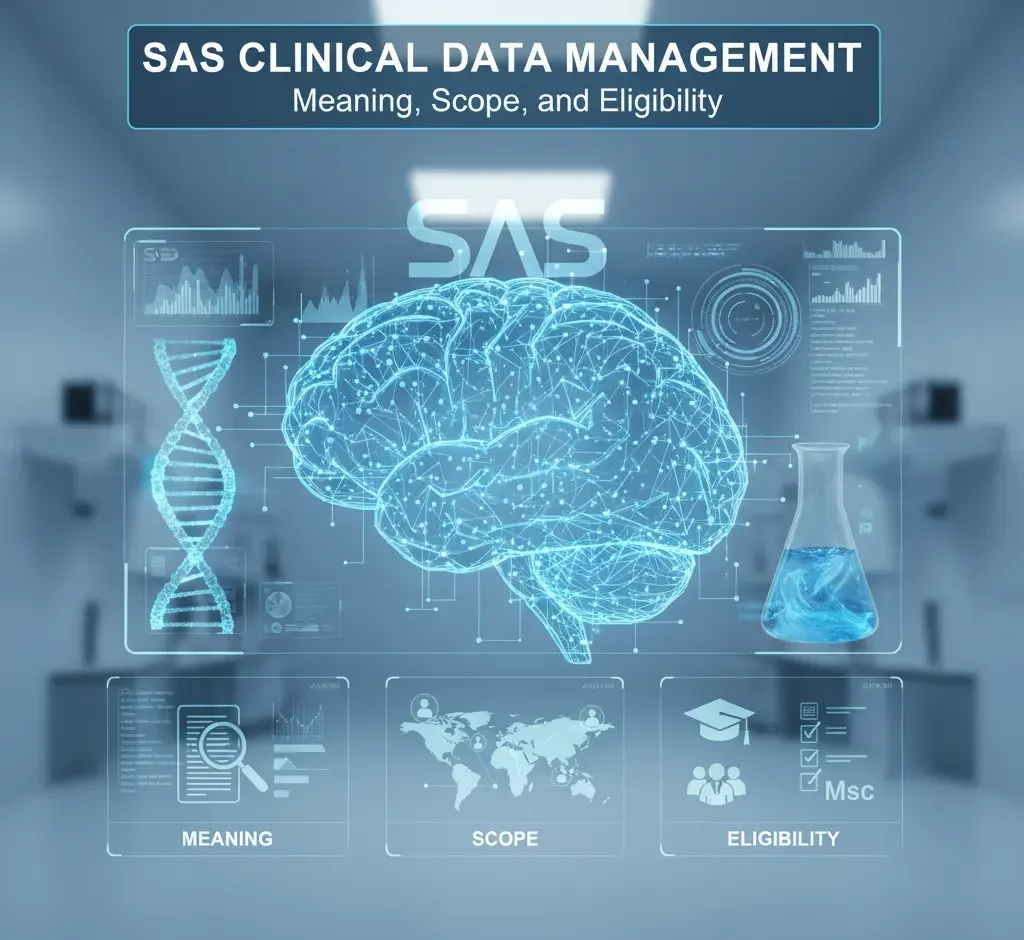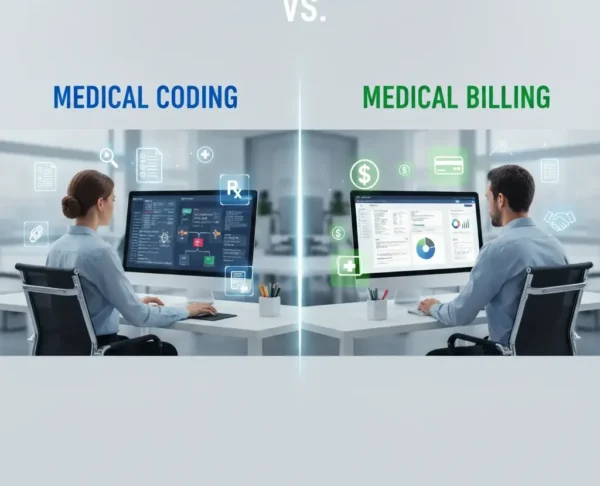SAS Clinical Data Management: Meaning, Scope, and Eligibility

In the evolving world of clinical research — especially with growing demand for skilled professionals through a clinical data management course in Hyderabad — the role of SAS Clinical Data Management has become indispensable. As healthcare companies and research organizations increasingly rely on data-driven decisions, professionals skilled in SAS are in high demand. This field not only bridges the gap between data analysis and clinical trials but also ensures that every piece of information contributes meaningfully to the advancement of medical science.
Understanding SAS Clinical Data Management
SAS Clinical Data Management refers to the process of collecting, validating, analyzing, and maintaining data obtained during clinical trials using the Statistical Analysis System (SAS). This process ensures that all data is accurate, consistent, and reliable before it’s submitted for regulatory approval or used in research publications.
SAS provides robust analytical capabilities, enabling clinical data managers to clean, structure, and interpret data efficiently. This ensures that researchers can make informed conclusions and that pharmaceutical companies can meet strict compliance requirements.
Professionals in this domain play a vital role in ensuring data integrity, maintaining patient confidentiality, and producing meaningful insights that shape the future of healthcare research.
The Importance of SAS in Clinical Research
The integration of SAS Clinical Data Management into clinical research workflows has revolutionized how organizations handle trial data. It has transformed raw data into organized, actionable reports that support drug development and approval processes.
Key advantages of SAS in clinical research include:
-
- Efficient Data Cleaning and Validation: Ensures error-free and consistent data.
- Regulatory Compliance: SAS aligns with FDA and CDISC standards for clinical trial submissions.
- Enhanced Reporting and Visualization: Enables easy interpretation of complex datasets.
Pharmaceutical companies, CROs (Contract Research Organizations), and biotech firms rely on SAS to streamline their operations and ensure transparency throughout the trial process.
Scope and Career Opportunities in Clinical SAS
The career opportunities in Clinical SAS are vast and growing. As the pharmaceutical and biotech sectors expand, there is a rising demand for professionals skilled in SAS data management. These professionals help convert complex trial data into structured reports that regulatory bodies can easily review. Jobs in SAS provide good career growth in the healthcare and pharma industries.
Popular Job Roles in Clinical SAS include:
-
- Clinical SAS Programmer
- Clinical Data Manager
- Biostatistician
- Clinical Data Analyst
- Clinical Research Associate
With proper training and certification, professionals can find employment in global organizations such as Pfizer, Novartis, IQVIA, and Parexel. Additionally, remote and hybrid roles are increasing, allowing flexibility for professionals across the globe.
2. What is the Clinical SAS eligibility requirement?
The Clinical SAS eligibility typically requires a background in life sciences, pharmacy, biotechnology, or statistics, along with basic computer and analytical skills.
3. What are the best SAS clinical training programs available?
The best SAS clinical training programs are those that provide hands-on experience, real-time projects, and cover advanced topics such as SDTM, ADaM, and CDISC standards. A top choice for many is a clinical data management course in Hyderabad offered by reputed institutes with strong placement support.
4. What are the career opportunities in Clinical SAS?
Career opportunities in Clinical SAS include roles such as SAS Programmer, Data Manager, Biostatistician, and Clinical Research Analyst in pharma and CRO companies.
5. How to learn SAS Data Management effectively?
You can learn SAS Data Management through structured online courses, internships, and self-paced programs that emphasize practical learning and real-world applications.
6. What is the eligibility for clinical certification?
Eligibility for certification generally includes a degree in a relevant field and basic knowledge of programming and data analysis concepts.
7. Is SAS Clinical Data Management a good career choice?
Yes, Clinical Data Management is a growing field offering strong job stability, competitive salaries, and global career opportunities.
8. What skills are required for a Clinical Data Manager?
Key skills include knowledge of SAS programming, data validation, regulatory compliance, and strong analytical and communication abilities.
9. How long does it take to complete a SAS programming training program?
Typically, SAS training programs last between 3 and 6 months, depending on the level of specialization and course intensity.
10. What is the future of SAS Clinical Data Management?
The future of SAS is bright, with AI and automation enhancing efficiency and accuracy in clinical data processing.
Conclusion
SAS Clinical Data Management is not just a career path — it’s a gateway to contributing to life-changing medical advancements. With the right training, you can build a rewarding career in this dynamic field.
If you’re planning to begin your journey, Ikya Career offers comprehensive and industry-relevant training programs in Data Management. Their expert-led sessions, practical exposure, and placement assistance make it one of the best platforms to start your clinical data management career confidently. Jobs in SAS are widely available for professionals with strong data analysis skills. Freshers can apply for entry-level jobs in SAS after completing proper training.
Frequently Asked Questions
1. What is SAS Clinical Data Management?
SAS Programming Data Management involves collecting, cleaning, and analyzing data from clinical trials using SAS software to ensure accuracy and compliance with industry regulations.
2. What is the Clinical SAS eligibility requirement?
The Clinical SAS eligibility typically requires a background in life sciences, pharmacy, biotechnology, or statistics, along with basic computer and analytical skills.
3. What are the best SAS clinical training programs available?
The best SAS clinical training programs are those that provide hands-on experience, real-time projects, and cover advanced topics such as SDTM, ADaM, and CDISC standards. A top choice for many is a clinical data management course in Hyderabad offered by reputed institutes with strong placement support.
4. What are the career opportunities in Clinical SAS?
Career opportunities in Clinical SAS include roles such as SAS Programmer, Data Manager, Biostatistician, and Clinical Research Analyst in pharma and CRO companies.
5. How to learn SAS Data Management effectively?
You can learn SAS Data Management through structured online courses, internships, and self-paced programs that emphasize practical learning and real-world applications.
6. What is the eligibility for clinical certification?
Eligibility for certification generally includes a degree in a relevant field and basic knowledge of programming and data analysis concepts.
7. Is SAS Clinical Data Management a good career choice?
Yes, Clinical Data Management is a growing field offering strong job stability, competitive salaries, and global career opportunities.
8. What skills are required for a Clinical Data Manager?
Key skills include knowledge of SAS programming, data validation, regulatory compliance, and strong analytical and communication abilities.
9. How long does it take to complete a SAS programming training program?
Typically, SAS training programs last between 3 and 6 months, depending on the level of specialization and course intensity.
10. What is the future of SAS Clinical Data Management?
The future of SAS is bright, with AI and automation enhancing efficiency and accuracy in clinical data processing.
Best SAS Clinical Training Programs
To succeed in this competitive domain, enrolling in one of the best SAS clinical training programs — such as a clinical data management course in Hyderabad — is essential. These programs teach core concepts such as data cleaning, CDISC standards, SDTM, and ADaM datasets — all critical for real-world clinical data management. A clinical statistical programmer uses SAS software to generate clinical study reports.
A structured SAS course helps you gain practical exposure to data handling and analysis, ensuring you are job-ready upon completion. Institutions offering specialized training programs equip learners with hands-on experience using clinical datasets.
Many professionals combine their SAS learning with medical coding training or pharmacovigilance training to strengthen their domain expertise in clinical research.
You can also explore options like medical coding training in Hyderabad or medical coding training in Ameerpet for added career versatility.
Clinical SAS Eligibility Criteria
Understanding Clinical SAS eligibility is crucial before enrolling in a training or certification program. Generally, aspirants with a background in life sciences, pharmacy, biotechnology, or computer science are preferred for SAS-related roles.
Eligibility for Statistical Analysis System (SAS) Clinical Certification includes:
-
- A bachelor’s or master’s degree in a relevant field (such as B.Pharm, M.Sc., B.Tech, or MBBS).
- Basic understanding of statistics and data interpretation.
- Familiarity with clinical research processes.
Having prior exposure to medical coding or pharmacovigilance training in Hyderabad can be an added advantage.
How to Learn SAS Clinical Data Management
If you’re wondering how to learn Statistical Analysis System (SAS) Clinical Data Management, there are multiple learning paths available depending on your background and goals. Beginners can start with foundational SAS programming, while professionals in the healthcare sector can opt for advanced clinical SAS modules.
Learning Methods:
-
- Online Courses: Enroll in interactive virtual programs to learn at your own pace.
- Hands-on Training: Work on real datasets and clinical trial projects.
- Workshops and Internships: Gain practical exposure under industry experts.
Additionally, blending SAS learning with pharmacovigilance courses in Ameerpet helps strengthen your understanding of regulatory workflows.
Tools and Technologies Used in SAS
Professionals working in Statistical Analysis System (SAS) Clinical Data Management often use a combination of tools and technologies to manage and analyze clinical data efficiently. Commonly used tools include:
-
- SAS Base & SAS Macro: For data analysis and automation.
- SAS/STAT: For advanced statistical procedures.
- SAS/GRAPH: For data visualization and graphical reporting.
- Oracle Clinical & Medidata Rave: For database management and electronic data capture.
Proficiency in these tools enhances employability and opens doors to high-paying roles in the pharmaceutical and research industries.
Benefits of Building a Career in Clinical Data Management
Building a career in Statistical Analysis System (SAS) Clinical Data Management offers long-term stability, attractive salaries, and international job opportunities. The increasing emphasis on data-driven healthcare decisions ensures that SAS professionals remain in demand globally.
Benefits include:
-
- Strong job security and competitive pay packages.
- Opportunities to contribute to life-saving clinical research.
- Options to work remotely or with global teams.
Professionals with dual expertise in SAS and pharmacovigilance training are especially valued for their holistic understanding of clinical research. A clinical statistical programmer supports drug development through data analysis.
Global Demand and Salary Trends
As healthcare industries continue to expand, the global demand for SAS Data Management professionals is skyrocketing. Countries like the USA, UK, India, and Singapore are major hubs for clinical SAS professionals. A clinical statistical programmer plays a key role in analyzing clinical trial data.
The average salary for an entry-level SAS programmer ranges from ₹4 LPA to ₹6 LPA in India, while experienced professionals earn ₹10 LPA and above. International salaries can range from $60,000 to $120,000 per annum, depending on skills and certifications. Many pharmaceutical companies offer jobs in SAS for clinical research projects.
Future Outlook for SAS Programming Data Management
The future of SAS Data Management looks promising, with AI integration and advanced analytics revolutionizing the field. As data volumes grow, professionals skilled in SAS will play an even more critical role in ensuring quality and compliance in clinical research.
Companies are also moving toward hybrid work models and global collaborations, further expanding career opportunities in clinical SAS for skilled individuals.
Conclusion
SAS Clinical Data Management is not just a career path — it’s a gateway to contributing to life-changing medical advancements. With the right training, you can build a rewarding career in this dynamic field.
If you’re planning to begin your journey, Ikya Career offers comprehensive and industry-relevant training programs in Data Management. Their expert-led sessions, practical exposure, and placement assistance make it one of the best platforms to start your clinical data management career confidently. Jobs in SAS are widely available for professionals with strong data analysis skills. Freshers can apply for entry-level jobs in SAS after completing proper training.
Frequently Asked Questions
1. What is SAS Clinical Data Management?
SAS Programming Data Management involves collecting, cleaning, and analyzing data from clinical trials using SAS software to ensure accuracy and compliance with industry regulations.
2. What is the Clinical SAS eligibility requirement?
The Clinical SAS eligibility typically requires a background in life sciences, pharmacy, biotechnology, or statistics, along with basic computer and analytical skills.
3. What are the best SAS clinical training programs available?
The best SAS clinical training programs are those that provide hands-on experience, real-time projects, and cover advanced topics such as SDTM, ADaM, and CDISC standards. A top choice for many is a clinical data management course in Hyderabad offered by reputed institutes with strong placement support.
4. What are the career opportunities in Clinical SAS?
Career opportunities in Clinical SAS include roles such as SAS Programmer, Data Manager, Biostatistician, and Clinical Research Analyst in pharma and CRO companies.
5. How to learn SAS Data Management effectively?
You can learn SAS Data Management through structured online courses, internships, and self-paced programs that emphasize practical learning and real-world applications.
6. What is the eligibility for clinical certification?
Eligibility for certification generally includes a degree in a relevant field and basic knowledge of programming and data analysis concepts.
7. Is SAS Clinical Data Management a good career choice?
Yes, Clinical Data Management is a growing field offering strong job stability, competitive salaries, and global career opportunities.
8. What skills are required for a Clinical Data Manager?
Key skills include knowledge of SAS programming, data validation, regulatory compliance, and strong analytical and communication abilities.
9. How long does it take to complete a SAS programming training program?
Typically, SAS training programs last between 3 and 6 months, depending on the level of specialization and course intensity.
10. What is the future of SAS Clinical Data Management?
The future of SAS is bright, with AI and automation enhancing efficiency and accuracy in clinical data processing.




